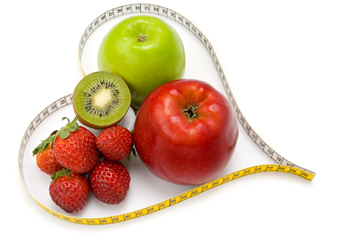Food is not the enemy. We need to eat in order to survive. In our culture, food often goes hand-in-hand with celebration, fellowship and comfort. There’s nothing wrong with enjoying food. But when a love of food results in overeating, it can become problematic, leading to weight gain and other health problems.
Many people recognize their need to lose weight, but their love of food simply gets in the way. If you love food, perhaps you’re even a self-proclaimed “foodie,” but also struggle with your weight, you may feel lost, conflicted, or unsure where to start on your journey to a healthier lifestyle. Rather than make radical, overnight changes in your diet, commit to making small, thoughtful changes in your eating habits.
Use these tips to make the shift to a healthier diet and jumpstart weight loss, without completely stifling your love of food.
Keep a food journal
Use a small notebook, or even a mobile app to keep a food diary of what you eat. Write down everything you put in your mouth, including drinks, for one week. Jot down the time of day and make a note of what you felt when you were eating. Were you sad, stressed, tired, happy or hungry? Were you eating simply because it was “time”?
After one week, take a look back through your food journal to see if you recognize any patterns in your eating habits. Are you eating when you’re not hungry? Do you always eat dessert? Have you been skipping meals? How many snacks are you eating throughout the day.
Identify any triggers that may cause you to engage in those unhealthy eating habits. What changes can you make in how you approach food each day? Where could you replace an unhealthy food option with a healthier choice?
Continue with your food journal, making a daily record of the foods you eat. Review your food diary often to remain aware of your triggers or cues for eating and make small changes, incorporating healthy eating habits over time, such as eating healthier snacks or drinking water instead of soda. As time goes on, this journal will serve as a source of accountability and help you identify where things went wrong when you fall off track.
Replace unhealthy habits
As you reflect on your food and eating habits and identify the triggers that may lead to unhealthy habits, consider simple behavioral changes you can make to help you shift to a healthier lifestyle. Some healthy eating habits include:
- Eat slowly. Put your fork down between bites, chewing your food thoroughly before the next bite. Give your body time to recognize when it’s had enough. If you scarf down your food at every meal, it is easy to overeat as your brain doesn’t have time to get the signal that your stomach is full.
- Avoid eating in isolation. Share lunch with a colleague. Sit down for dinner with your family. Have a neighbor over for dinner. When you eat with others, enjoying both food and conversation, you may eat more slowly, and be less likely to gorge yourself.
- Only eat when you’re truly hungry, and stop eating when you’re full. Your parents may have taught you to clean your plate as a child, but that habit can lead to overeating. Listen to your body and know when you’ve had enough and your hunger is satisfied.
- Pay attention to how you feel. If you are eating because you are stressed or anxious, try exercise instead. Tired? Take a nap (if you can). Feeling sad or depressed? Reach out and talk to someone. Bored? Find a non-food activity you enjoy to kill some time.
- Make meal planning a priority. Take time at the beginning of each week to play your meals for the week. Planning ahead of time helps ensure that you don’t make a last minute decision that takes you through the drive-thru rather than eating a healthy lunch at your desk.
Reinforce healthy eating habits
It takes time for lifestyle changes to become habit, and it certainly doesn’t happen overnight. Give yourself a pat on the back when you make a healthy choice over an unhealthy one. Celebrate the milestones, even the smallest ones, along the way. Be patient with yourself, and recognize that we are all guilty of making unhealthy choices from time to time. But over the long run, as you consciously make an effort to develop a healthy relationship with food, you will begin to reap the benefits of those healthy changes in your life.
Making the shift toward healthy eating habits to lose weight will affect more than your waistline. Adopting healthy lifestyle habits can improve your health, allowing you to truly enjoy life without being hooked on food.
Are you ready to get started on your weight loss journey? Contact First Baptist Medical Center today to speak with an experienced Dallas weight loss doctor who can help you establish healthy lifestyle habits.





